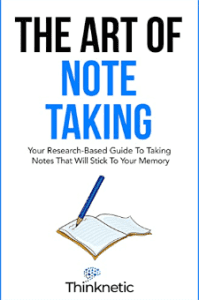About The Art Of Note Taking: Your Research-Based Guide To Taking Notes That Will Stick To Your Memory by Thinknetic Thinknetic
Other books tell you how to take notes. This book shows you the right way how.
You did everything right this semester. You attended all your classes and took copious notes at each lecture. As far as you’re concerned, you’re ready for finals.
Only thing is, those notes that you thought were so great? They no longer make any sense.
Picture another scenario where you’re at an important work meeting. You’re scribbling furiously, afraid to miss anything being said about the big project. Afterward, your boss approaches you for a copy.
You look down at the disorganized handful of scribbles in your hand. Do you dare hand it to them?
If you’re either of these people, you’re not alone. Even though it’s something you would have done every day at school, most people aren’t great at taking notes.
That’s because modern education takes for granted the very skills that build good note-taking habits.
This is unfortunate because note-taking has so many potential benefits.
According to a 2014 study published by the Association for Psychological Science, note-taking helps students make connections that help them retain material better.
In this study, Pam Mueller and David Oppenheimer credit note-taking with giving students the time to process the ideas being explained.
Hence, concepts aren’t simply regurgitated – concepts are understood. The psychological research concludes note-taking leads to better performance.
Business leaders also swear by the benefits of note-taking. Thomas Edison, Richard Branson, and Bill Gates are all prodigious notetakers, and no one can deny their career success in their respective fields.
But if note-taking is such an important skill, why don’t more people learn it?
For starters, in the age of overwhelming information, most people believe note-taking is hard. Second, it requires practice.
Even if they start, most people feel lost and quit before any real progress is made.
This book helps you overcome these challenges.
Here’s a small peek at what you’ll learn from its pages:
● Your core learning style and how to pick the right note-taking technique for you
● The five note-taking strategies they never taught you at school
● Why most people are poor at taking notes and what you can do to fix it
● The four benefits of taking notes… including one you’d never have thought of
● How to weight lift with notes to build that memory muscle
● This critical quality which separates the best notetakers from the rest of us
● When note-taking is a team sport: How teachers can help students become better note takers
● The surprising answer to “Is it better to take notes by laptop or by hand?”
…and much, much more!
The most important thing about this book is that it won’t just dump information onto you. There are exercises to improve your new skills and tips to practice and improve what you’ve learned. This book can stand by you throughout your entire progress.
Everyone can benefit from better note-taking. Who doesn’t want to remember more of what they learned? Who doesn’t want to do better at work or school?
Don’t let the fear of overwhelming information stop you from taking notes that will stick. Become more productive today. Click “Add to Cart” now!
Buy the book, and follow the author on social media:
Author Bio:
Visit thinknetic.net and get our bestseller “Critical Thinking In A Nutshell” & 2 thinking improvement booklets for FREE!
Thinknetic publishes books that speak to people’s minds. We love uncovering and discussing topics like critical thinking, philosophies, or mental models (to name a few), and we’re earnest to share with you their daily applicability.
Our books start the conversation about the thought process and ways to improve it from different perspectives. Expect to be entertained, inspired, maybe a little bit enlightened, and supported to take action.
In every book, we provide you with a mix of storytelling, timeless quotes, theories made easy (and making a lot more sense), tools, and strategies to support you in improving your life while improving your thinking.
Want to know more? Click on “Visit Amazon’s Thinknetic Page” and check out our other books as well!
